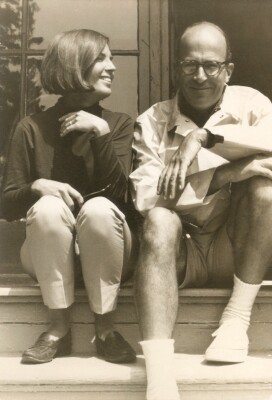
One of the greatest gifts Roger Angell gave me, and he gave me many, was the perspective neither to minimize nor overstate the diminutions of talent and capability that come with age.
I was at my little temporary desk at The New Yorker, where I worked long hours in the summer of 2002 as Roger’s editor on the collection Game Time, and Roger popped in to see how I was doing.
As part of putting the collection together, besides making recommendations—I remember saying I felt his Bob Gibson profile “Distance” had to be in the collection—I also explored with Roger larger ideas about why his writing on baseball held up. We together hashed out some creative approaches, like cobbling together snippets of three Pete Rose pieces I’d dug up in the New Yorker archives, published in the book under the title “Three Petes.” Years later I’d work with Pete on a book, Play Hungry, and get to know him—and continued to think Roger had seen Rose as few others had.
My role with Roger was in part to be an enthusiast, a representative of all those readers out there, many of us baseball writers ourselves, who felt we owed everything to Roger’s example. In that context, Roger and I talked about how he felt he might—by then he was in his early eighties—have declined.
He stared out the window, looking out over the Manhattan skyline stretching out south of Times Square, and told me that was the hardest part: To know in what ways he had declined, and in what ways the limitations he sometimes felt owed to other factors.
“It’s like Bob Boone told me,” he said, looking out, and he knew I knew just what he meant.
“I remember when Bob Boone was playing late in his career as a catcher, he was talking about what it’s like to be an older player,” Roger had told me for an August 2000 piece I wrote on him for Salon.com. “He said, ‘The main thing for me is to have a bad day and not to say ‘I’m getting old,’ because I had a lot of bad days when I wasn’t old. They’re going to tell me when I’m too old to play. If I have a slump, I have to tell myself it’s just a slump.'”
I’ve thought of that exchange hundreds of times in the years since: Somehow for me it was freeing. If Roger wrestled with his own limitations that way, then it made me feel less absurd about my own struggles, my own days when I woke up convinced that any magic I might have had in my fingertips on a given day was forever a thing of the past.
Roger’s 100th birthday on Saturday brought out the tributes, many of which I’m sure Roger enjoyed. Then again, I wish I had a video of him spitting out the word “encomia”—he viscerally hates anything that verges on hagiography.
I won’t gush about Roger, except to say he had it right, what he conveyed to me, looking out at rooftop water towers and, far below, honking yellow cabs: If you can be clear-eyed about the ways in which decline or other changed circumstances have shifted your sense of the possible, you can find yourself pursuing new directions.
As he once told me, in a description of his baseball writing that applies to his essays as well: “What I’ve been doing a lot of times is reporting. It’s not exactly like everybody else’s reporting. I’m reporting about myself.”
Few of us will end up writing anything as good as Roger’s late-in-life master work, the essay “This Old Man,” but we can continue to surprise ourselves. We can refuse to let inertia slow us down. We can dare to be fresh.
– Steve Kettmann
Want to receive Steve’s blog on writers and writing by email? Sign up below.

